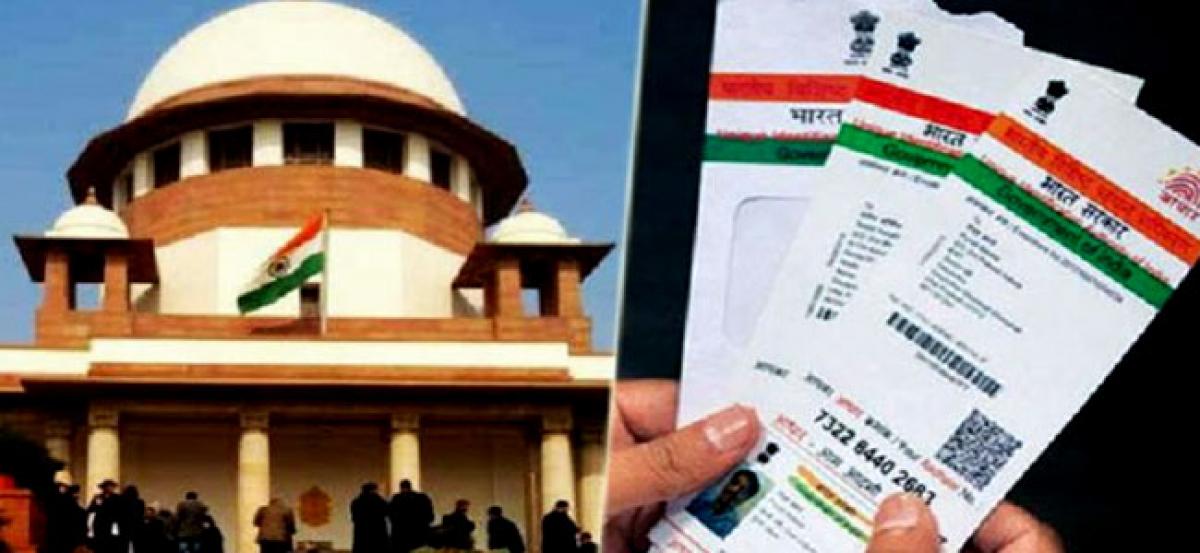Live
- Telangana's Traditions Will Be Protected, Village by Village : BRS Leader MLC K. Kavitha
- Uganda to relocate 5,000 households from landslide-prone areas in eastern region
- Harish Rao Criticizes CM Revanth Reddy: "His Time is Over"
- Vijay Sethupathi Hails 'Vidudala-2' as a Theatrical Game-Changer
- Sahaj Yog: A Path to Inner Transformation and Harmony City takes giant strides
- Allu Arjun meets his uncle Nagababu at his residence
- J&K L-G felicitates Langar organisations & NGOs for contribution during Amarnath Yatra
- Hit by Covid, MP's Rakesh Mishra sees revival of his fortunes, courtesy PM SVANidhi scheme
- Trailblazing Yakshagana Artiste Leelavathi Baipaditthaya No More
- Cong in direct fight with BJP on 45-50 seats in Delhi Assembly election: Sandeep Dikshit
Just In

\"There is no doubt about the identity of fraudsters. The bank knows whom it is giving loan and it is the bank officials who are hand-in-
The Supreme Court today observed that Aadhaar can do little to stop banking frauds and also questioned the Centre for asking the entire population to link their mobile phones with the unique identity card "just to catch a few terrorists".
The apex court also observed that bank officials were "hand-in-glove" with fraudsters and that scams do not happen because the culprits are unknown.
The court made the observations after the Centre argued that Aadhaar would help curb ills like terrorism and banking frauds.
It then asked the Centre what will happen, if tomorrow, the authorities such as the UIDAI, by way of an administrative order, asks the citizens to part with their DNA, semen and blood samples as part of their Aadhaar demographics.
A five-judge constitution bench headed by Chief Justice Dipak Misra, hearing a clutch of petitions challenging the validity of Aadhaar and its enabling 2016 law, while prima facie disagreeing with the Centre's submissions said Aadhaar was "not the solution" to banking frauds.
"There is no doubt about the identity of fraudsters. The bank knows whom it is giving loan and it is the bank officials who are hand-in-glove with the fraudsters. Aadhaar can do little to stop it," the bench, which also comprised justices A K Sikri, A M Khanwilkar, D Y Chandrachud and Ashok Bhushan, said.
"Banking fraud does not happen because of multiple IDs", the bench told Attorney General K K Venugopal, representing the Centre, who had submitted that biometrics were safe and could solve problems like "money laundering, bank frauds, income tax evasion and terrorism".
"Aadhaar will not prevent an individual from operating layers of commercial transactions. It would not prevent bank frauds either," the bench said, adding that it may only help the authorities in finding out non-existent beneficiaries of schemes like MGNREGA.
Elaborating, the bench said a person in different capacities and through various entities could enter into multi-layered commercial transactions and take loans which are not "illegal per se".
Venugopal then submitted that linking of Aadhaar with mobile phones would help in catching terrorists, planning to bomb a place.
"Do terrorists apply for SIM cards? It is a problem that you are asking the entire 120 crore people to link their mobile phones with Aadhaar just to catch a few terrorists," the bench asked him.It said the government may have "legitimate State interest", but the issue was whether to catch a few, 120 crore people can be asked to link Aadhaar with mobile. "Mere legitimate state interest does not ensure proportionality," it added.
The bench also said that the State suspends internet services to control the violent situations and nobody questions its authority. But the issue arises when all citizens are asked to link their mobiles with Aadhaar.
The top law officer then said Aadhaar may help in ensuring upliftment of people who are below poverty line and such persons constituted 67 per cent of the total population when the Britishers left and now it stood at 27 per cent.
To this, the bench said "the gap (between rich and poor) is widening from independence and today. 67 per cent wealth is with one per cent of people." The percentage of BPL persons may have decreased, but the problem is that their number is rising, it said.
The bench referred to the provision of Aadhaar Act which defines "biometric information" as "photograph, finger print, iris scan, or such other biological attributes of an individual as may be specified by regulations".
"This may not pass the proportionality test," the bench said, adding that "the heart of the matter is as to how far you can stretch the (Aadhaar) net." "Many, on the other side, have argued that they have no objection to Aadhaar. But you want (Aadhaar) authentication for each and every activity of the citizens. It's there that the question of proportionality arises," the bench said.
Venugopal said the UIDAI was seeking minimal information to generating Aadhaar and most of it was already available in public domain. He referred to the example of lawyers and said their addresses, phone numbers, photographs are there in public domain.
He said the invasion of privacy was very minimal in Aadhaar and it may not even be considered as an invasion.

© 2024 Hyderabad Media House Limited/The Hans India. All rights reserved. Powered by hocalwire.com







